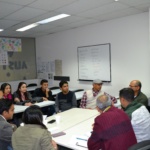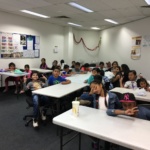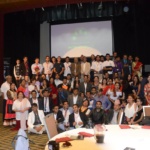Background
Under the Australian Government Humanitarian Settlement Program, between 2008 and now, about 500 people of Bhutanese Nepali origin including adults and children were settled in Sydney areas. After 7 years in Australia, most children of this community can speak and write English very well but they have either completely or partially forgotten their mother language, Nepali. This has created a communication barrier within and outside the family. Children cannot communicate in Nepali and parents and grandparents cannot talk or speak English well. This is causing a rift in the family and children try to avoid their own parents/grandparents at home or outside. As a result, the love, affection and the bond that a common language brings within a family is eroding. Parents and grandparents feel low and depressed. The greatest source of joy and happiness for parents and grandparents, that is, talking and playing with their children/grandchildren is getting lost. For children, not being able to talk in their mother lang uage means they do not understand their parent’s and grandparent’s problems, and not able to preserve their own linguistic and cultural heritage. The essence of promoting our Australian multiculturalism is defeated. It is important for every Australian citizen to preserve their language, culture, heritage in order to practice multiculturalism effectively and knowing and speaking an ethnic language plays a very important role.
uage means they do not understand their parent’s and grandparent’s problems, and not able to preserve their own linguistic and cultural heritage. The essence of promoting our Australian multiculturalism is defeated. It is important for every Australian citizen to preserve their language, culture, heritage in order to practice multiculturalism effectively and knowing and speaking an ethnic language plays a very important role.
This project aims to teach Nepali language in the community by first developing the resources and then engaging its own members as teachers in the community.
What is the expected outcome of this project?
- Teach and promote Nepali language to children of Bhutanese community so that they can speak and understand their ethnic language
By doing this, we are promoting and empowering some community members who can be effective bilingual speakers which is a bonus to the service providers and government, besides creating some part-time employment - Through a common language in the family, promote better communication and understanding in the family, thus relieve stress, anxiety and depression, other social and mental health issues which is quite common in refugee communities
- Through Nepali classes, teach and promote the ethnic language, heritage and culture, values, arts and crafts of the community which is the essence of multicultural Australia

- Foster a happy family relationship through common ethnic language
- Keep children engaged so that they are least exposed to TV and computer games
How will the project perform and how will it be monitored for a positive outcome?
1. All children of Bhutanese community in Sydney who cannot speak or speak a little Nepali will be documented before the start of the project
2. Another assessment will be done after 6 months to see what improvements in talking/speaking in Nepali each child has made; some assessing tools will be developed for this
3. A final assessment will be done at the end of the project, that is, after 1 year
4. Likewise, community elders will be interviewed at the beginning, and after 6 and 12 months to see the impact of the project on the Nepali speaking ability of Bhutanese children and how the project has affected them
5. Nepali teachers will be interviewed at 6 and 12 months to see how the project has benefited them as well as the children and the community
6. Simple tools to measure the engagement of the children by this project and how it reduced their time with TV and computer games with be developed and implemented
Who will benefit from the project and why?
The whole Bhutanese Community in Western Sydney will benefit from this project. The benefits are numerous as listed below:
1. Children of Bhutanese origin will learn their mother language and through language they will learn their culture and tradition which is the essence of multiculturalism in Australia. 
2. Parents and grandparents will benefit equally since a common language gives a sense of bonding.
3. The interaction between children and parents/grandparents will increase, thus keeping them engaged and occupied.
4. It helps address some mental health issues like isolation and loneliness especially for older people.
5. It provides some part-time employment to and engagement of the community volunteers.
6. It produces more bilingual teachers and translators which is a bonus to the service providers and government.
7. Over 25 million people spread across Nepal, Bhutan, Northern India and other parts of the world speak Nepali. Producing our own Australian Nepali speakers will help the government when carrying out Australian funded international projects like AusAid and other programs in Nepal, Bhutan and other countries.
